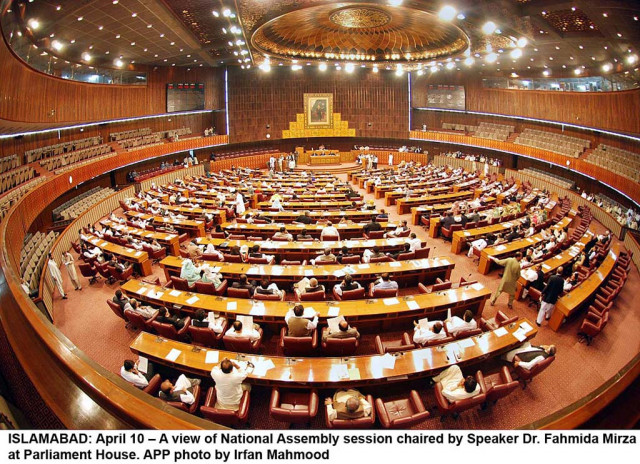‘Combating political patriarchy remains a challenge’
Youth stress need to change mindsets rather than altering electoral process

National Assembly of Pakistan. PHOTO: APP
From discrimination and violence to a lack of support and resources, women face countless challenges while participating in the civic and political life of their countries. Strengthening women's rights and addressing barriers to political participation are critical to achieving gender equality and female empowerment. This was said by Aurat Foundation (AF) Programme Manager Natasha Rathore who was speaking at Afghan Studies Center's 23rd Pak-Afghan Youth Dialogue in Islamabad.
Both Pakistan and Afghanistan have reserved seats for women to ensure substantial political representation for them. However, the specific modalities of gender quotas and women posted through this mechanism become key determinants that continue to negatively affect their political placements.
Women elected through quotas are reported as feeling obliged to act for women as a group and are inspired to bring new issues to the table.
However, majority women representatives seek to disassociate themselves from the quota and women's issues to demonstrate that they are 'serious' politicians. At the same time, many have been accused of acting only as proxies for men and of being excessively loyal to party leaders.
Thus, a question arises, are quotas a sufficient mode of intervention to allow for a quantitative and qualitative decrease in the gender disparity or is there a need to do a lot more?
The youth emphasised less on the electoral process or the overall system and stressed more on the need to change the mindset.
The key goes back to economics; only financially strong women can work alongside men in open competition. Hence, education and economic empowerment are the first few things to start with to ensure women empowerment in totality.
This was the 23rd round of Pak-Afghan Youth Dialogue series held under the Afghan Studies Center–a sister organisation of the Center for Research and Security Studies (CRSS) - which now has an alumni of over 500 Pakistani and Afghan youth. Afghan Studies Center aims to encourage peace narratives and critical thinking through its monthly Pak-Afghan youth dialogue series, and quarterly training workshops, which focus on the skill development and capacity building of emerging future leaders from both countries.
Published in The Express Tribune, April 26th, 2019.



















COMMENTS
Comments are moderated and generally will be posted if they are on-topic and not abusive.
For more information, please see our Comments FAQ